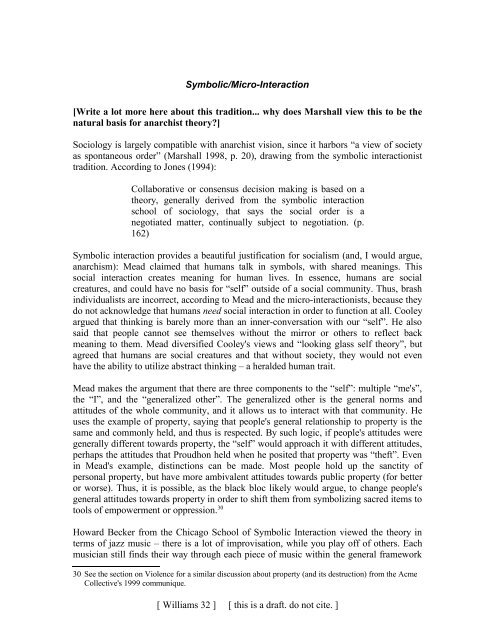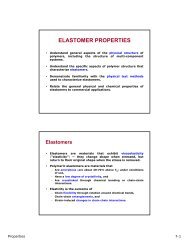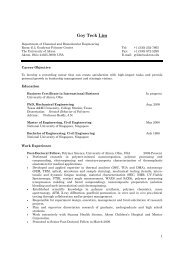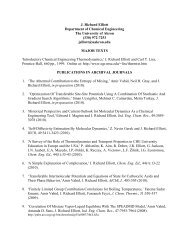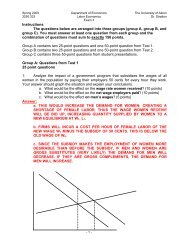Sociology of the Anarchists - Gozips.uakron.edu - The University of ...
Sociology of the Anarchists - Gozips.uakron.edu - The University of ...
Sociology of the Anarchists - Gozips.uakron.edu - The University of ...
You also want an ePaper? Increase the reach of your titles
YUMPU automatically turns print PDFs into web optimized ePapers that Google loves.
Symbolic/Micro-Interaction<br />
[Write a lot more here about this tradition... why does Marshall view this to be <strong>the</strong><br />
natural basis for anarchist <strong>the</strong>ory?]<br />
<strong>Sociology</strong> is largely compatible with anarchist vision, since it harbors “a view <strong>of</strong> society<br />
as spontaneous order” (Marshall 1998, p. 20), drawing from <strong>the</strong> symbolic interactionist<br />
tradition. According to Jones (1994):<br />
Collaborative or consensus decision making is based on a<br />
<strong>the</strong>ory, generally derived from <strong>the</strong> symbolic interaction<br />
school <strong>of</strong> sociology, that says <strong>the</strong> social order is a<br />
negotiated matter, continually subject to negotiation. (p.<br />
162)<br />
Symbolic interaction provides a beautiful justification for socialism (and, I would argue,<br />
anarchism): Mead claimed that humans talk in symbols, with shared meanings. This<br />
social interaction creates meaning for human lives. In essence, humans are social<br />
creatures, and could have no basis for “self” outside <strong>of</strong> a social community. Thus, brash<br />
individualists are incorrect, according to Mead and <strong>the</strong> micro-interactionists, because <strong>the</strong>y<br />
do not acknowledge that humans need social interaction in order to function at all. Cooley<br />
argued that thinking is barely more than an inner-conversation with our “self”. He also<br />
said that people cannot see <strong>the</strong>mselves without <strong>the</strong> mirror or o<strong>the</strong>rs to reflect back<br />
meaning to <strong>the</strong>m. Mead diversified Cooley's views and “looking glass self <strong>the</strong>ory”, but<br />
agreed that humans are social creatures and that without society, <strong>the</strong>y would not even<br />
have <strong>the</strong> ability to utilize abstract thinking – a heralded human trait.<br />
Mead makes <strong>the</strong> argument that <strong>the</strong>re are three components to <strong>the</strong> “self”: multiple “me's”,<br />
<strong>the</strong> “I”, and <strong>the</strong> “generalized o<strong>the</strong>r”. <strong>The</strong> generalized o<strong>the</strong>r is <strong>the</strong> general norms and<br />
attitudes <strong>of</strong> <strong>the</strong> whole community, and it allows us to interact with that community. He<br />
uses <strong>the</strong> example <strong>of</strong> property, saying that people's general relationship to property is <strong>the</strong><br />
same and commonly held, and thus is respected. By such logic, if people's attitudes were<br />
generally different towards property, <strong>the</strong> “self” would approach it with different attitudes,<br />
perhaps <strong>the</strong> attitudes that Proudhon held when he posited that property was “<strong>the</strong>ft”. Even<br />
in Mead's example, distinctions can be made. Most people hold up <strong>the</strong> sanctity <strong>of</strong><br />
personal property, but have more ambivalent attitudes towards public property (for better<br />
or worse). Thus, it is possible, as <strong>the</strong> black bloc likely would argue, to change people's<br />
general attitudes towards property in order to shift <strong>the</strong>m from symbolizing sacred items to<br />
tools <strong>of</strong> empowerment or oppression. 30<br />
Howard Becker from <strong>the</strong> Chicago School <strong>of</strong> Symbolic Interaction viewed <strong>the</strong> <strong>the</strong>ory in<br />
terms <strong>of</strong> jazz music – <strong>the</strong>re is a lot <strong>of</strong> improvisation, while you play <strong>of</strong>f <strong>of</strong> o<strong>the</strong>rs. Each<br />
musician still finds <strong>the</strong>ir way through each piece <strong>of</strong> music within <strong>the</strong> general framework<br />
30 See <strong>the</strong> section on Violence for a similar discussion about property (and its destruction) from <strong>the</strong> Acme<br />
Collective's 1999 communique.<br />
[ Williams 32 ] [ this is a draft. do not cite. ]


